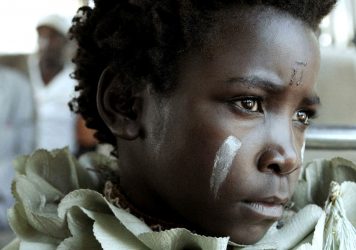
The death of a beloved uncle in a middle-class Zambian family brings some difficult truths to light in Rungano Nyoni's surreal second feature.
One evening, while driving home from a friend’s fancy dress party, Shula (Susan Chardy) discovers a dead boy in the middle of a deserted road. On closer inspection, she realises it’s her Uncle Fred. Being a level-headed young woman who is good in a crisis, Shula calls her father for advice. After asking her to send him money for rent, Dad assures her he’ll arrive at the scene shortly to assist (but she’ll need to pay for his taxi too). The tragicomic opening scene of Rungano Nyoni’s second feature is a microcosm of what will unfold during the film; Shula – restrained, efficient, mature – is saddled with the increasingly manic demands and expectations of her extended family, who descend en-mass on her mother’s house to mourn…and stake their claim to Uncle Fred’s estate.
Part of Shula’s funeral duties includes wrangling two of her more volatile cousins, Nsansa (Elizabeth Chisela) and Bupe (Esther Singini). When Nsansa makes a shocking confession about Uncle Fred while drunk, she is quick to laugh it off, but as more and more family members descend on the home, it becomes a pressure cooker, with tensions between the elder and younger generations beginning to escalate, and animosity towards Fred’s young widow growing exponentially. There are many things that the family not only choose to not discuss, but actively buries for the sake of self-preservation; Fred’s death acts as a great flood, unearthing the bodies buried beneath. It’s only when the three cousins unite – along with Fred’s ostracised widow – that they are able to start piecing together some hard truths about the past.
Building on the explorations of mob mentality and what is gained and lost in the rigorous preservation of family and cultural tradition that she demonstrated in her debut feature I Am Not A Witch, Nyoni is fast establishing herself as a truly original storyteller, combining the fantastical and brutally grounded to create a film that feels uniquely disquieting. For it’s not so much that the rest of the family were unaware that one of their number was abusing young women, but rather that they conspired to cover it up, concerned with their own image and the preservation of reputation above the lives of others.
As her relatives tearily eulogise Uncle Fred with one eye on the inheritance, Shula’s concerns and growing anger are repeatedly waved away – even by her own father. Instead, she is expected to be a dutiful daughter. In one scene, as she frantically looks for Bupe, various oblivious male relatives repeatedly ask her to fetch plates of food for them. Shula, who has never known any different, cannot yet push back against how her family have always done things.
Anchored by Susan Chardy’s restrained performance, On Becoming A Guinea Fowl might touch on hot-button themes of sexual violence, misogyny and familial cycles of abuse, but Rungano Nyoni finds her own intriguing language to explore them. Consider, for example, the film’s fabulously odd title, the significance of which becomes clear through glimpses of a children’s television programme – Nyoni weaves allegory with realism in a manner that nods to her Zambian and Welsh heritage, both possessing a rich folklore history.
Published 16 May 2024

Modern-day African witchcraft is viewed through a child’s eyes in this intriguing debut from Rungano Nyoni.